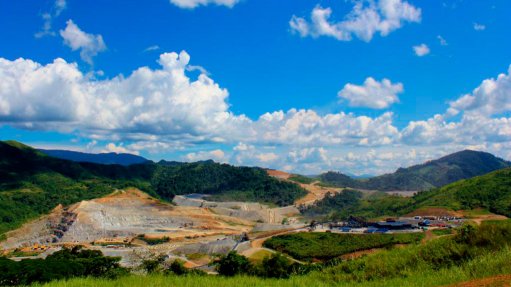Lawyer not ‘distressed’ by possibility of Mining Charter being finalised in October


WARREN BEECH The summit, and what has resulted from it, has resulted in a different, more positive, scenario
Photo by Creamer Media
The successful two-day Mining Summit – held this month at the request of Mineral Resources Minister Gwede Mantashe – provided a platform for stakeholders to voice their concerns during substantive discussions on nearly all aspects of the revised Mining Charter, says Hogan Lovells partner and mining head Warren Beech.
The summit, which was held in Boksburg on July 7 and 8, resulted in the Department of Mineral Resources (DMR) meeting with various stakeholders, including mining companies, unions and community groups to discuss the revised Mining Charter, rebuilding trust, and enabling industry and government to edge closer to agreement.
Beech notes that, when the event was first announced, the concern was that it would simply be a ‘talk shop’ with no measureable outcomes.
“Those concerns have been put to bed as pretty much everything across the spectrum in the draft Mining Charter was discussed . . . The concern that the summit would come and go, and that nothing would happen, have also been put to bed because of Minster Mantashe extending the public consultation period to the end of August.”
Beech says that, given the number and range of people who participated in the summit, reaching consensus at the event was unlikely, but that there was a common theme and understanding by everyone involved that “more work needs to be done”.
He is not distressed by the charter being finalised toward the latter part of the year – most likely September or October – because he regards it as a positive delay.
Beech explains that, when the publication of the draft Mining Charter was delayed from May to June, and particularly when Mantashe decided to apply for leave to appeal the ‘once empowered, always empowered’ judgment, it created a trust deficit. But he adds: “I think the summit, and what has resulted from it, have rebuilt the relationship to some extent . . . I think we’re in a different scenario – one that is more positive.”
Summit Themes
Four major themes emerged from the summit – the application of the ‘once empowered, always empowered’ principle, the 10% free-carried interest, the procurement targets, and community involvement, with particular emphasis on the latter.
“Communities have always been a very important stakeholder, and they have always had a voice, but there have been demands to move toward greater consultation and involvement in the granting of mining rights,” says Beech.
He suggests that this demand is going to bring about more discussion, because of the way communities are fighting for active involvement in decision-making, rather than just being briefed about aims and developments through consultation.
Beech states that several delegates demonstrated that the free-carry stipulation was a major concern, and that, in conjunction with the trickle dividend requirement, it would certainly ensure that some projects become either nonviable or would delay their viability to a time when commodity prices sufficiently accommodated lower returns on investment. However, he adds: “Commodity prices are all over the place at the moment, and mining companies can’t sustainably predict where the prices are going, and adjust their operations accordingly.”
Thus, Beech notes the free carry will remain a contentious issue, as it will impact on the junior mining sector, the emerging midtier sector and exploration.
Beech says that, if Mantashe’s primary concern is that black economic empowerment (BEE) partners are being pushed out, there are existing mechanisms in the Mineral and Petroleum Resources Development Act to address the issue, as “ . . . the Minster has powers of investigation, he can issue compliance notices and can suspend licences, if he needs to”.
Beech lauds the current charter for acknowledging and accepting the ‘once empowered, always empowered’ principle, adding, however, that the principle is applicable only where the mining company historically attained 26% ownership.
“If you achieved 26% and then lost it because your BEE partner exited, then you’re given credit for that . . . the primary concern now is, if you transfer the mining right, you lose that recognition, which creates problems for disposal and acquisition activity.”
Further, companies that renew their mining rights also lose their historical credit and must immediately comply with the new 30% ownership target.
He suggests, that if the DMR concedes to allowing companies to retain their historical credit, it would in all likelihood completely resolve the ‘once empowered, always empowered’ issue.
Beech adds that the concerns surrounding the procurement targets, including the unnecessary exclusion of offshore companies supplying the industry with goods and services, contravene the South African Constitution, and the World Trade Organisation obligations in terms of the General Agreement on Tariffs and Trade, and the General Agreement on Trade and Services.
He concludes by suggesting that the DMR introduce a sliding scale of free-carry and procurement – that is, reducing the current percentages and having them increase gradually over time would be less prohibitive on new operations, and junior and emerging miners as a whole.
Comments
Press Office
Announcements
What's On
Subscribe to improve your user experience...
Option 1 (equivalent of R125 a month):
Receive a weekly copy of Creamer Media's Engineering News & Mining Weekly magazine
(print copy for those in South Africa and e-magazine for those outside of South Africa)
Receive daily email newsletters
Access to full search results
Access archive of magazine back copies
Access to Projects in Progress
Access to ONE Research Report of your choice in PDF format
Option 2 (equivalent of R375 a month):
All benefits from Option 1
PLUS
Access to Creamer Media's Research Channel Africa for ALL Research Reports, in PDF format, on various industrial and mining sectors
including Electricity; Water; Energy Transition; Hydrogen; Roads, Rail and Ports; Coal; Gold; Platinum; Battery Metals; etc.
Already a subscriber?
Forgotten your password?
Receive weekly copy of Creamer Media's Engineering News & Mining Weekly magazine (print copy for those in South Africa and e-magazine for those outside of South Africa)
➕
Recieve daily email newsletters
➕
Access to full search results
➕
Access archive of magazine back copies
➕
Access to Projects in Progress
➕
Access to ONE Research Report of your choice in PDF format
RESEARCH CHANNEL AFRICA
R4500 (equivalent of R375 a month)
SUBSCRIBEAll benefits from Option 1
➕
Access to Creamer Media's Research Channel Africa for ALL Research Reports on various industrial and mining sectors, in PDF format, including on:
Electricity
➕
Water
➕
Energy Transition
➕
Hydrogen
➕
Roads, Rail and Ports
➕
Coal
➕
Gold
➕
Platinum
➕
Battery Metals
➕
etc.
Receive all benefits from Option 1 or Option 2 delivered to numerous people at your company
➕
Multiple User names and Passwords for simultaneous log-ins
➕
Intranet integration access to all in your organisation



















